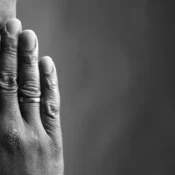5 Tips for Coping with The Loss of a Parent(s)
I recently watched the first episode of Kanye West (Ye)‘s documentary, Jeen-Yuhs. I am a fan of his work, especially when he first debuted as a rapper. And, as a fan, l knew that he had lost his mum, which had been tough for him.
But watching the last few minutes of episode 1 had me in tears as l realised the extent of how tough it was. Ye didn’t just lose his mum.
He lost his best friend, his confidant, cheerleader and the one person who understood him (in my opinion). He was 30 years old, and while he is often misunderstood, the impact of losing his mum is undeniable.

Parents are the gatekeepers of their children’s lives, who, for some (not all), give unconditional love and raise their children, sometimes sacrificing so much.
Most people assume everyone has a parent and that your mum or dad checking up on you or getting your favourite meals made is the norm, but it’s not.
Some people have never met their parents; some have lost them young, middle-aged or older. So contrary to what we think, having parents is not the norm for everyone.
I have a friend who never met her Dad (he died before she was born). Every anniversary, we chat, and on one particular one, l asked her how she was feeling, and she told me that though she misses him, she never knew him.
She can only experience him through other people’s memories. She is told you look like him, behave like him. But she never knew him. Isn’t that an onerous burden to carry?
While we can not underestimate the impact of losing a loved one and the trauma it brings, we should acknowledge that losing a parent is indescribable. Because most who lost a parent(s) will have milestones they will reach in life, they won’t be able to tell their parents.
Ahead of us will be world celebration days (mothers day and fathers day), and shops will be filled with gift ideas. However, many will walk into their local shops daily or weekly and be constantly reminded that they don’t have what everyone else is celebrating.
It won’t be easy, and it may feel like the longest months they face.

Five Tips To Cope With The Loss of a Parent(s)
We have put together five tips to help handle the loss of a loved one. And while these tips are not full proof (because every loss is unique to an individual), we hope they can help you if you have lost a parent(s) or help you if you are supporting or want to support someone who has lost a parent(s).
- What you feel is valid.
When you go through grief, your feelings will go from one extreme to another, from feeling anger, frustration, confusion and being overwhelmed with it all.
It can stem from how your parent(s) died, the last conversation you had (or didn’t have), the handling of affairs and the responsibility you may have in it. It is all full force, and you reach a point where you feel like you are not coping.
However, what you feel is valid, it’s normal, and you shouldn’t try to disregard it or blame yourself for it. Instead, try to let the emotions you experience be when they come and talk about them to those you trust.
It’s OK to acknowledge what you feel and say “I am angry because” or “what hurts the most is” acknowledging your feelings will not take the pain away, but it helps you validate what you are experiencing.
- Be kind to yourself
Once you hear those words “they have passed”, “unfortunately, they didn’t make it”, or ‘they are gone.” Shock, denial and pain hit you all at the same time. Then, you begin to just survive. You wake up, and the days seem longer than before.
You can be in a room full of people and not be there. You wonder how others can just carry on. At times you may not care about eating or even what you wear. You are just surviving. In these challenging times, remember to be kind to yourself.
This can look different for everyone; it could be self-care; you can keep healthy routines, maybe plan what you eat, ensuring that you carve out time for yourself. You can also practise mindfulness, which encourages you to pay attention to the present.
With this, you can speak with a close friend, you can also journal, and if you are afraid to talk about your feelings, you can write them down. Being kind to yourself may be difficult while grieving, but it is essential to your wellbeing while navigating one of life’s most difficult experiences.

- Accept help
When you are feeling at your lowest, weak, confused and experiencing intense loneliness, accepting help can be the last thing on your mind. However, when you are in the midst of loss, you can also be surrounded by love.
People will want to show that love by doing things and being there. While some people may not explicitly state how they want to help.
Others will ask, “is there anything l can handle for you with the funeral” “can l drive you where you need to go” or “would you like me to look after this” If you find yourself being asked these questions, where you can, accept the help being offered to you.
People want to be there for you. While they can not share what you are feeling, they want to help because seeing you hurt makes them want to take any more pain away from you.
- Honour their memory
Grief doesn’t end when the funeral is over. For some, the reality of it all hits after, and it could be days, months or years. The shock that can come with loss can cause a high level of trauma.
Once this comes, you may worry about remembering your parent(s), especially if you have children of your own. You may wonder, “how will they know what grandmum or grandad was like?” And you also face your worries of remembering them.
However, there are many ways you can honour the memory of your parent(s). It can be creating a memory album, starting a charity or deciding to do something special every year on their birthday or anniversary.
However you choose to, honouring the memory of your parent(s) can help you celebrate their life even after they are gone.

- Consider grief support groups
During the grief journey, you may not want to be pressured into getting professional help, especially when you are not ready.
Something you can consider is joining a grief support group. In group support, you hear others speak of their loss, which can help you find your voice and share your experience.
You create a connection with people who can provide emotional support, validation and continual learning on the grief journey.
For some, a grief support group can be a stepping stone to professional help, while for others, it’s not. However, whatever the end outcome may be, considering a grief support group is beneficial and can play a pivotal part in your grief journey.
Have you lost a parent(s)? What are some tips that have helped you in your grief journey? We would love to hear from you, please share your thoughts in the comments.

Kumbi volunteers as the editorial lead for Balanced Wheel. She was part of the first Balanced Wheel peer support group cohort after losing her husband unexpectedly. Using stories, she hopes to end the stigma and taboo of talking about grief and to provide resources that will give individuals support as they walk through their grief journeys.
Author
One thought on “5 Tips for Coping with The Loss of a Parent(s)”
Add a Comment
Recent Posts
Grief and Mental Health – Round Post
Collective Grief – Round Post
Getting Over The Death Of A Loved One
Your Story
Matters
info@balancedwheel.co.uk



I am really impressed along with your writing abilities and
also with the format in your blog. Is this a
paid theme or did you modify it yourself? Either way keep up
the nice quality writing, it’s rare to look a nice blog like
this one nowadays. Madgicx!